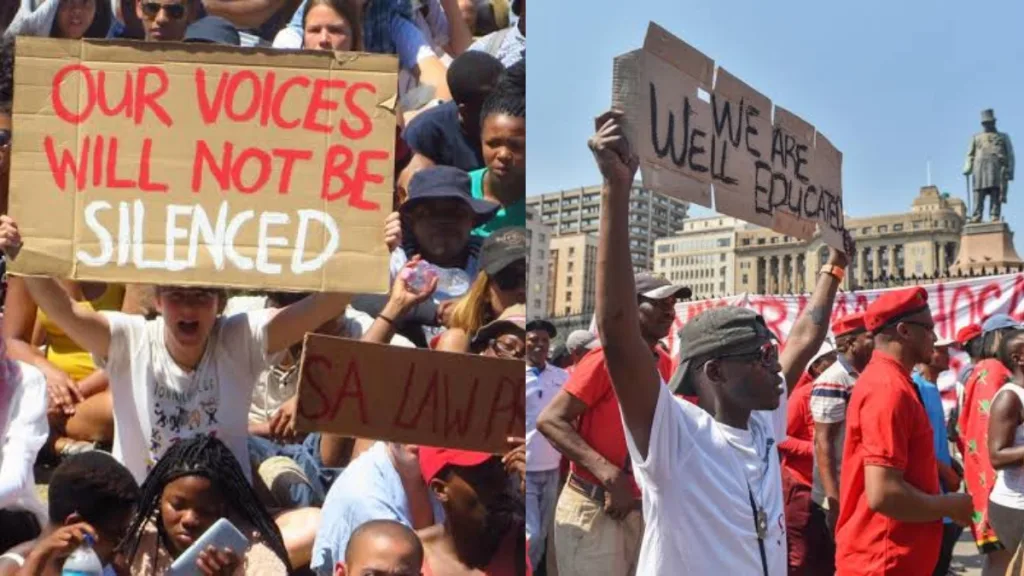The deep crisis of institutional trust documented in South Africa is neither isolated nor surprising. Across continents, democracies are confronting an unsettling reality: citizens no longer believe that institutions act in their interest. From South Africa to South Asia and Latin America, declining faith in legislatures, police, courts, and political parties has become a defining pattern of our era. As surveys show, when trust erodes, so does obedience to the rule of law. When people begin to believe the system itself is compromised, protest becomes not just possible, but inevitable.
South Africa illuminates this phenomenon sharply. Trust in Parliament has collapsed, public faith in policing is at historic lows, and accusations of institutional capture have become commonplace. A senior police official alleging connections between law-enforcement authorities and organised crime is not just a scandal; it is a democratic rupture. The principle described decades ago by David Easton — that trust and legitimacy are intertwined — is on display. Once citizens are convinced that institutions are incapable of protecting them or are actively compromised, they begin to detach themselves from the democratic framework altogether.
But this is not unique to South Africa. A global wave of youth-led uprisings, particularly powered by Gen Z, shows how institutional decay has ignited protest movements elsewhere. In Nepal, for example, young people took to the streets in force after the government attempted to impose a sweeping social-media ban. Reports described lethal crackdowns, with Al Jazeera documenting how six people were killed during Gen Z demonstrations protesting the ban and broader mistrust in governance.
Similarly, in Bangladesh, Gen Z activists have fuelled a sustained wave of protests, challenging corruption, authoritarian overreach, and economic mismanagement. The Dhaka Tribune noted how youth-led demonstrations have become a defining force in the country’s political landscape, part of a larger global pattern of young people losing patience with institutions they see as unresponsive or illegitimate.
These uprisings echo across borders. Indonesia’s students have mobilised against democratic backsliding. Peru witnessed massive youth protests against political instability and corruption. In Sri Lanka, young people helped spark the movement that toppled a president. As Al Jazeera asked in a regional analysis: is South Asia becoming fertile ground for Gen Z revolutions?
Underlying these eruptions is the same crisis described in the South African context: a fundamental breakdown of trust. When legislatures are viewed as self-serving, when courts appear compromised, when police are feared rather than respected, and when political parties seem disconnected from the realities of citizens’ lives, the entire democratic compact becomes fragile. The Scroll article notes that nearly half of South Africans surveyed felt it was unnecessary to obey the laws of a corrupt government, an alarming precursor to civic disengagement or revolt. When this sentiment multiplies across nations, the global democratic order begins to wobble.
The future, if this erosion continues, may look increasingly volatile. Wide-scale protests against the “system” could become normalised in multiple democracies, not as isolated events but as recurring waves. The risk is not only chaos but also the opportunistic rise of far-right groups claiming to offer decisive “solutions.” When institutions weaken, strongmen thrive. Around the world, far-right populists have leveraged public distrust, portraying institutions as outdated, corrupt, or “mere constitutional obligations” that stand in the way of national revival. This is how democracies slide, slowly at first, into illiberalism: the institutions still exist, but hollowed out, stripped of authority, and replaced by executive dominance.
The dire question is not whether protests will increase, they already have, but what happens when a frustrated generation decides that formal democracy is incapable of reforming itself. When Gen Z uprisings erupt simultaneously across continents, when traditional institutions are unable to command respect, and when political actors exploit chaos rather than resolve it, the global democratic fabric risks tearing.
Yet this trajectory is not inevitable. Institutional trust can be rebuilt, but only through accountability, transparency and meaningful reform. Governments must address corruption with seriousness, not rhetoric. Institutions must operate with independence and communicate with clarity. Citizens, especially the younger generation, must transform protest energy into organised political participation and civic oversight.
If democracies do not correct course, they may soon discover that trust, once broken, is not easily restored. And without trust, democracy becomes little more than a constitutional formality, vulnerable to extremism on all sides. The world today stands at a crossroads between renewal and rupture, and how institutions respond in the coming years will determine whether this century belongs to democracy or to those who seek to dismantle it.

